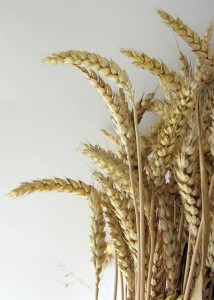 by Fr. Patrick Henry Reardon
by Fr. Patrick Henry Reardon
Sometimes in the Gospels we find an abrupt transition of contrasting scenes to convey an irony fundamental to the Gospel itself. For example, strength made perfect in infirmity, or the wisdom revealed to the simple.
Observe such a contrast, for instance, in the following sequence:
“[Jesus says,] ‘Come to me, all who labor and are heavy laden, and I will give you rest. Take my yoke upon you and learn from me, for I am meek and lowly in heart, and you will find rest for your souls. For my yoke is easy and my burden is light.’ At that time Jesus went through a field of grain on the Sabbath. His disciples, being hungry, began to pluck heads of grain and to eat” (Matthew 11:28-12:1).
The first part of that transition comes at the end of what is arguably the loftiest, most spiritual section of Matthew’s Gospel. It begins,
“I thank You, Father, Lord of heaven and earth, that You have hidden these things from the wise and prudent and have revealed them to infants (nepioi) . . . . All things have been delivered to me by my Father, and no one knows the Son except the Father” (11:25-27).
From that sublime height, including Jesus’ invitation to come to him, there is an abrupt declension to the mundane walking of hungry men through a sown field. This sequence illustrates the actual experience of the Christian life, the concrete existence in which “we who live are always delivered to death for Jesus’ sake, that the life of Jesus also may be manifested in our mortal flesh” (2 Corinthians 4:11).
These Apostles, these “infants,” to whom the Son transmits his intimate knowledge of his Father, labor and are heavy laden in this world, confessing
“we have this treasure in earthen vessels, that the excellence of the power may be of God and not of us” (4:7).
Matthew heightens this contrast by commencing each scene with the same formula. Both aspects of the Christian life are revealed, he declares, en ekeino to kairo, “a that time.” This expression, used only these two times in Matthew’s Gospel, serves to bind the two complementary scenes:
First, there is the conveyance of the divine Mystery:
“At that time Jesus answered and said, “I thank You, Father, Lord of heaven and earth, that You have hidden these things from the wise and prudent and have revealed them to infants” (Matthew 11:25).
Second, there is the concrete earthly situation in which the Mystery is conveyed to those infants:
“At that time Jesus went through a field of grain on the Sabbath. His disciples, being hungry, began to pluck heads of grain and to eat” (12:1).
“That time,” therefore, refers to the Sabbath, symbolizing the “rest” Jesus gives to those who come to him and receive the revelation of the Father.
Matthew’s coupling of these scenes is vital, inasmuch as the walking, the hungering, and the plucking of the grain illustrate what Jesus means when he speaks of those “heavy laden.” To such as hunger and labor in this world he promises an easy yoke and a “light” burden—that is to say, in rabbinical terms, a load that can be carried without violating the Sabbath.
This is the “rest for your souls” Jesus provides for those who come to him. It consists in the knowledge of the true God revealed in and through His Son. The true Sabbath, therefore, is the presence of Christ, who walks with his disciples through their field of hunger. Having become a human being in order to reveal the Father, the Son shares their condition in the field.
Matthew goes on to speak of the “wise and prudent” who accuse those apostolic infants when, on the Sabbath, they “began to pluck heads of grain.”
“Look,” they tell Jesus, “Your disciples are doing something not lawful to do on the Sabbath!”
These accusers know nothing of the Sabbath rest. Rather, they
“bind heavy burdens, hard to bear and lay them on men’s shoulders but will not, themselves, lift a finger to adjust them” (23:4).
These are the “wise and prudent,” to whom the knowledge of the Father has not been revealed. For them the Sabbath itself is a burden.
The Lord of the Sabbath, the One promising “rest for your souls,” responds to their accusation, summoning to mind great David, who
“entered the house of God and ate the Bread of the Presence, which was not legitimate for him to eat, nor for those who were with him” (12:4).
David’s Son and the Lord of the Sabbath are one and the same.
